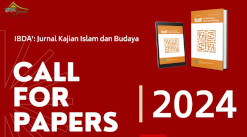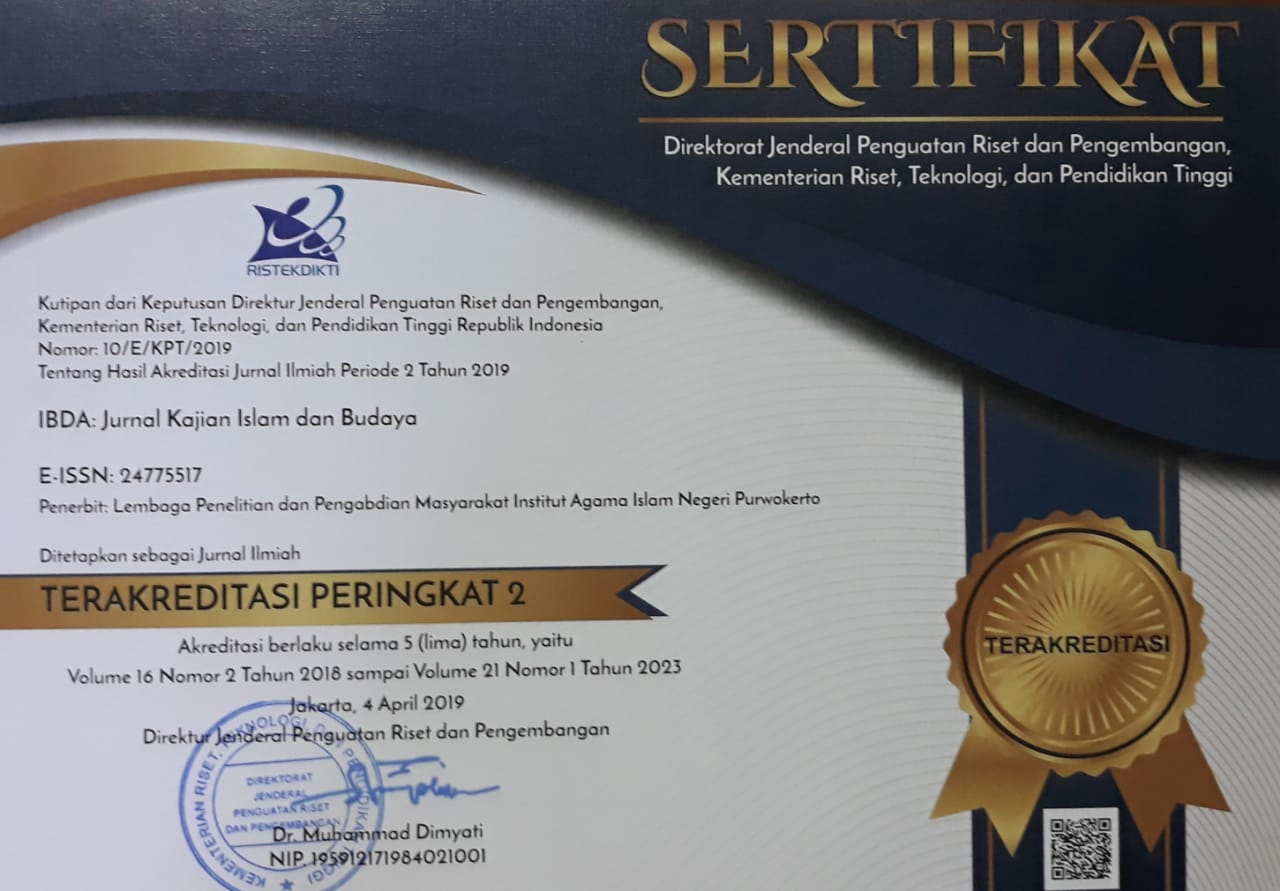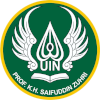Reinforce Nationality Through Religious Local Tradition (Case Study of Malam Tirakatan in Yogyakarta)
DOI:
https://doi.org/10.24090/ibda.v14i2.672Keywords:
Celebrate, Independence Day, Malam Tirakatan, AcculturationAbstract
Celebrating of IndependenceDay became a part of symbol of honour from the citizenship for their country. In many places freedom is celebrated, including in Indonesia. The celebration is an annual event organized by goverment and citizen, both formal and informal. Formally, the goverment of Indonesia from local level to the centre celebrate this day by flag ceremony on the seventeent of August. Somehow in non-formal, citizen commemorate this day by various manner such aspanjatpinang contest etc. One form of celebration in Indonesia to celebrate the independence day is called “malam tirakatan†or “malam pitulasanâ€, especially in the area of Yogyakarta. Malam tirakatan is kind of acculturation from Moslem local tradition.This paper describe aboutmalam tirakatanas an acculturation between religious local traditions with a sense of nationalism. I use the method of triangulation for collect data which are participant observation, deep interview and documentation. The location of this research is focused on two different places, first in Dukuh the village of Bantul district and second in Ngaseman village, a part of village of Kulon Progo district. From this research known that Indonesian Moslems reinforce their nationality by their religious local tradition.Downloads
Download data is not yet available.
References
al-Mahalli, J. a.-S. (1990). Tafseer al-Jalalayn. Cairo: Dar el-Hadith .
Bayudi. (2015, August 16). Nationality in Holy Quran. (W. Imaduddin, Interviewer)
Beatty, A. (2003). Varieties Of Javanese Religion: An Anthropological Account. Cambridge: Cambridge University Press.
Gulevich, T. (2004). Understanding Islam and Muslim Traditions. Detroit: Omnigraphics.
Kathir, A. a.-F. (1419 H). Tafseer Ibn Kathir. Beirut: Dar Kotob al-Ilmiah .
Maarif, A. S. (2015). Menimbang Kembali Keindonesiaan dalam Meneropong Masalah Keadilan, Kemanusiaan, Kebinekaan dan Toleransi. In W. G. Wahid, Fikih Kebinekaan; Pandangan ISlam Indonesia Tentang Umat, Kewargaan dan Kepemimpinan Non Muslim (pp. 20-28). Bandung: Bandung.
Matsumoto, D. (Desember 2007). Culture, Context and Behavior. Journal Of Personality, , 1285-1290.
Moller, A. (2005). Ramadan in Java: The Joy and Jihad of Ritual Fasting. Sweden: Lund University Press.
Muhaimin, A. (July 1995). The Islamic Tradition of Cirebon; Ibadat and Adat Among Javanese Muslims. Canberra Australia: The Australian National University.
Peursen, V. A. (1976). Cultural Strategies. Yogyakarta: Kanisius.
Picard, M. (2011). Agama, adat and Pancasila. In M. P. Madinier, The Politics of Religion in Indonesia: Syncretism, Orthodoxy and Religious Contention in Java and Bali (pp. 1-20). London: Routledge.
Pustaka, B. (2008). Kamus Besar Bahasa Indonesia. Jakarta: Departemen Pendidikan dan Kebudayaan.
Qomar, M. (2012). Fajar Baru Islam Indonesia; Kajian Komperhensif Atas Sejarah dan Dinamika Intelektual Islam Nusantara. Bandung: Mizan.
Rahmanei, S. A. (2010). Islam and Nationalism; A Theoritical Point of View. Message of Thaqalayn, 115-142.
Suryanegara, A. M. (2012). Api Sejarah 2. Bandung: Salamadani.
Taukhid, M. (2015, August 16). Prize in Malam Tirakatan. (W. I. Muhammad, Interviewer).
Woodward, M. (2011). Java, Indonesia and Islam. London: Springer.
Bayudi. (2015, August 16). Nationality in Holy Quran. (W. Imaduddin, Interviewer)
Beatty, A. (2003). Varieties Of Javanese Religion: An Anthropological Account. Cambridge: Cambridge University Press.
Gulevich, T. (2004). Understanding Islam and Muslim Traditions. Detroit: Omnigraphics.
Kathir, A. a.-F. (1419 H). Tafseer Ibn Kathir. Beirut: Dar Kotob al-Ilmiah .
Maarif, A. S. (2015). Menimbang Kembali Keindonesiaan dalam Meneropong Masalah Keadilan, Kemanusiaan, Kebinekaan dan Toleransi. In W. G. Wahid, Fikih Kebinekaan; Pandangan ISlam Indonesia Tentang Umat, Kewargaan dan Kepemimpinan Non Muslim (pp. 20-28). Bandung: Bandung.
Matsumoto, D. (Desember 2007). Culture, Context and Behavior. Journal Of Personality, , 1285-1290.
Moller, A. (2005). Ramadan in Java: The Joy and Jihad of Ritual Fasting. Sweden: Lund University Press.
Muhaimin, A. (July 1995). The Islamic Tradition of Cirebon; Ibadat and Adat Among Javanese Muslims. Canberra Australia: The Australian National University.
Peursen, V. A. (1976). Cultural Strategies. Yogyakarta: Kanisius.
Picard, M. (2011). Agama, adat and Pancasila. In M. P. Madinier, The Politics of Religion in Indonesia: Syncretism, Orthodoxy and Religious Contention in Java and Bali (pp. 1-20). London: Routledge.
Pustaka, B. (2008). Kamus Besar Bahasa Indonesia. Jakarta: Departemen Pendidikan dan Kebudayaan.
Qomar, M. (2012). Fajar Baru Islam Indonesia; Kajian Komperhensif Atas Sejarah dan Dinamika Intelektual Islam Nusantara. Bandung: Mizan.
Rahmanei, S. A. (2010). Islam and Nationalism; A Theoritical Point of View. Message of Thaqalayn, 115-142.
Suryanegara, A. M. (2012). Api Sejarah 2. Bandung: Salamadani.
Taukhid, M. (2015, August 16). Prize in Malam Tirakatan. (W. I. Muhammad, Interviewer).
Woodward, M. (2011). Java, Indonesia and Islam. London: Springer.
Downloads
Published
2016-10-02
How to Cite
Muhammad, W. I. (2016). Reinforce Nationality Through Religious Local Tradition (Case Study of Malam Tirakatan in Yogyakarta). IBDA` : Jurnal Kajian Islam Dan Budaya, 14(2), 157–171. https://doi.org/10.24090/ibda.v14i2.672
Issue
Section
Articles
License
Authors who publish with this journal agree to the following terms:
- Authors retain copyright and grant the journal right of first publication with the work simultaneously licensed under a Creative Commons Attribution-ShareAlike License a that allows others to share the work with an acknowledgement of the work's authorship and initial publication in this journal.
- Authors are able to enter into separate, additional contractual arrangements for the non-exclusive distribution of the journal's published version of the work (e.g., post it to an institutional repository or publish it in a book), with an acknowledgment of its initial publication in this journal.
- Authors are permitted and encouraged to post their work online (e.g., in institutional repositories or on their website) before and during the submission process, as it can lead to productive exchanges, as well as earlier and greater citation of published work (See The Effect of Open Access).

















